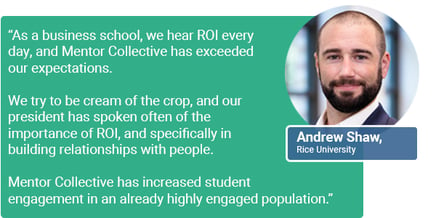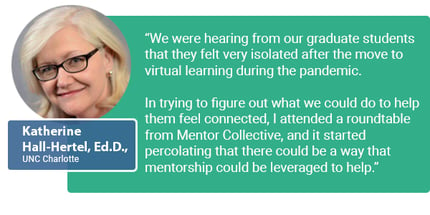Scaling Student Success Efforts for Graduate Institutions
In a positive trend, graduate enrollment has grown by 4.9 percent since 2019—a major win considering the impact that the COVID-19 pandemic has had on higher education institutions across the country and world.
Mentorship can be an incredibly important way to maintain and enhance these student relationships, increasing feelings of graduate student belonging and engagement with your university.
On March 2, 2022, Mentor Collective hosted a virtual roundtable discussion to discern from our panel of experts how their targeted graduate student mentorship programs are helping support their students.
The roundtable was co-hosted by the University of Pennsylvania School of Social Policy & Practice with guest speakers:
- Sara S. Bachman, Ph.D., Dean, School of Social Policy & Practice, University of Pennsylvania
- Jennifer J. Clinkscales, DSW, LCSW, Associate Dean of Student Affairs, the University of Pennsylvania
- Andrew Shaw, Associate Director of Student Programs, Rice University - Jones Graduate School of Business
- Katherine Hall-Hertel, Ed.D., Associate Dean, Graduate Academic, and Student Affairs, The Graduate School, University of North Carolina, Charlotte
- Suprawee Tepsuporn, Ph.D., Senior Assistant Dean for Graduate Professional Development, Graduate College, University of Delaware
Moderator Dr. George White, inaugural managing director of student access and success (retired) and Professor Emeritus at Lehigh University, discussed various wins and challenges with panelists on their institutions’ mentorship programs. Some key findings are below:
Broaden Your Perspective on Mentoring Relationships
As panelists shared details of their successful mentoring programs, it became clear that they are thinking in unconventional ways about supporting their students where they are in their journey. These graduate schools host mentoring programs targeted toward MBA students, Ph.D. students, and graduate students of color, to name a few, and paired them with a variety of types of mentors to offer appropriate support. 
For example, the Jones Graduate School of Business at Rice University has found that matching first-year graduate students with alumni instead of upper-level students has brought success to all involved—including return on investment (ROI).
“As a business school, we hear ROI every day, and Mentor Collective has exceeded our expectations. We try to be cream of the crop, and our president has spoken often of the importance of ROI, and specifically in building relationships with people. Mentor Collective has increased student engagement in an already highly engaged population.” -- Andrew Shaw, Associate Director of Student Programs, Rice University - Jones Graduate School of Business
At the University of Delaware Graduate College, they host an inclusive alumni mentoring program with a particular focus on supporting graduate students of color. Their relationship with Mentor Collective began after hearing colleagues at UD’s College of Arts & Sciences “just raving about how MC has helped with student recruitment and retention, as well as alumni engagement,” says Suprawee Tepsuporn, Ph.D., senior assistant dean for graduate professional development.
“When we completed our strategic planning process, two of the goals we articulated were 1) building a welcoming, respectful, diverse, and resilient graduate community and 2) recruiting and retaining the best and brightest graduate students. Our mentoring program allowed us to pursue these goals by helping to expand the support system for our graduate students, a constellation of mentors, and we intentionally recruit students from historically underrepresented and marginalized backgrounds—like first-generation or low-income students—because we know they have more challenges, and we want to show we are aware of their unique challenges and supportive of their success.” – Suprawee Tepsuporn, Ph.D., Senior Assistant Dean for Graduate Professional Development, Graduate College, University of Delaware
Research-Driven Mentoring Infrastructures Help You Work Smarter
Increased enrollment doesn’t always mean increased staffing, and often the addition of a large-scale mentorship program doesn’t seem doable from a time standpoint. However, strategically designed programs like those from Mentor Collective have an infrastructure in place to track and respond to student issues without the need for additional employee hours.
“The flags have been amazing in helping us have additional eyes and ears and to keep track of students who may not come to the Student Affairs Office and ask for help. Them being put on our radar when they have a problem allows us to do more targeted outreach with the right resources.” -- Jennifer J. Clinkscales, DSW, LCSW, Associate Dean of Student Affairs, the University of Pennsylvania
Graduate Mentorship Can Support Mental Health
Graduate school—especially doctoral programs—often have a “secret curriculum” that new students have to learn on the fly, such as how to have conversations with their advisors, what important program milestones they need to achieve, and more. At the Graduate School at UNC Charlotte, they turned a Higher Education Emergency Relief Fund (HEERF) grant to support mental health into a peer mentoring intervention to help doctoral students through the educational changes of COVID-19. 
“We were hearing from our graduate students that they felt very isolated after the move to virtual learning during the pandemic. In trying to figure out what we could do to help them feel connected, I attended a roundtable from Mentor Collective, and it started percolating that there could be a way that mentorship could be leveraged to help.” -- Katherine Hall-Hertel, Ed.D., Associate Dean, Graduate Academic, and Student Affairs, The Graduate School, University of North Carolina, Charlotte
--
Mentor Collective roundtables encourage conversation and peer- to-peer interaction. The insights offered were valuable to university leaders as we collectively work to ensure student success. Mentor Collective strives to empower every student to form the relationships they need to build resilience, self-efficacy, and a sense of belonging.
To start a conversation about how to utilize mentorship to engage and support your students, contact Mentor Collective today.